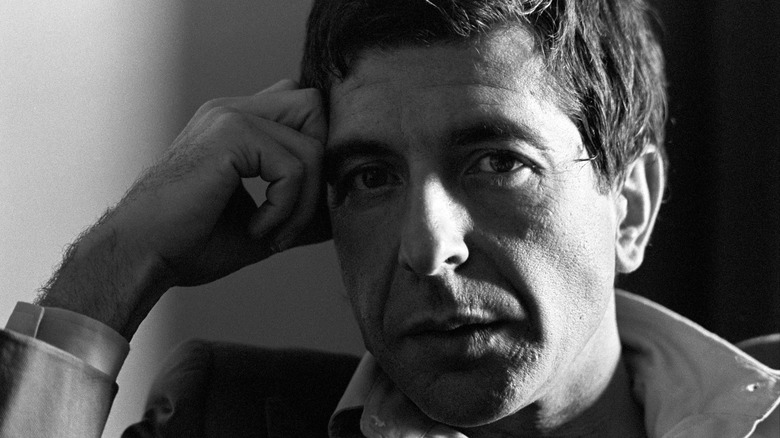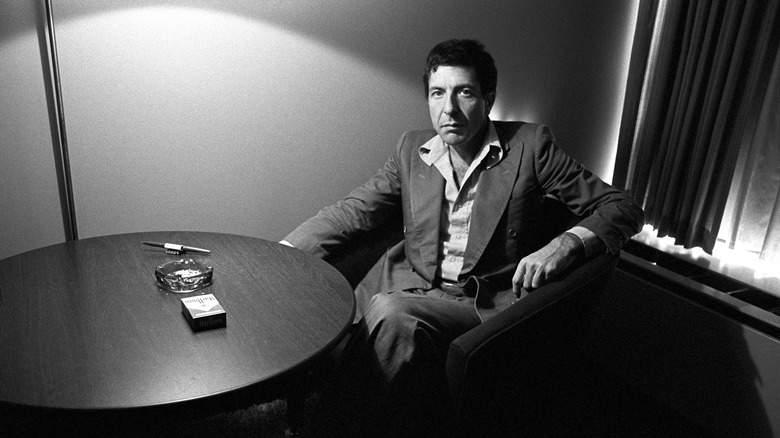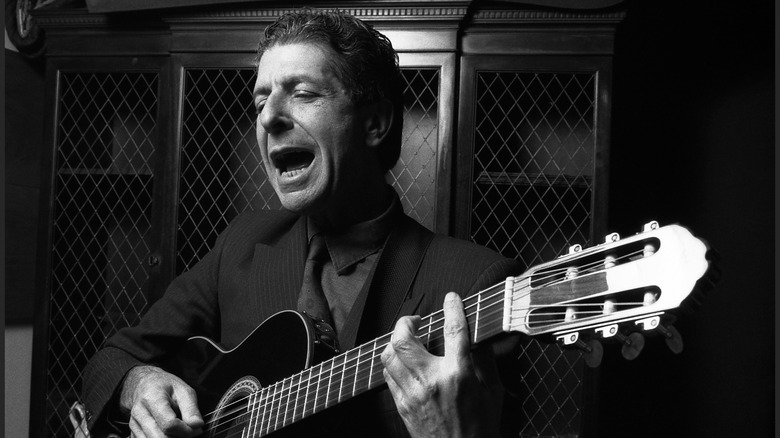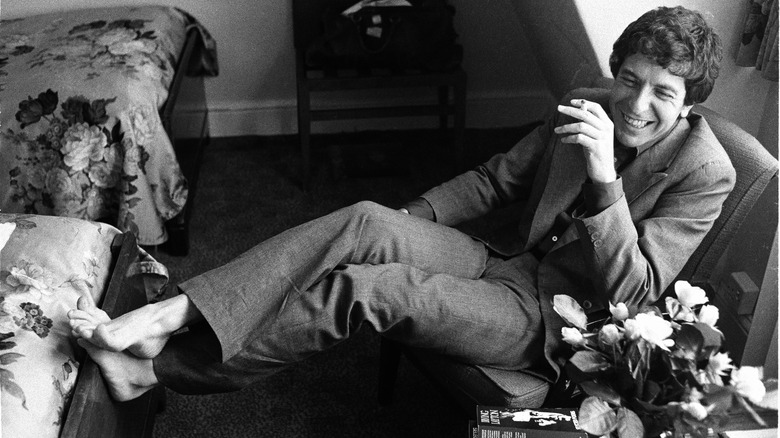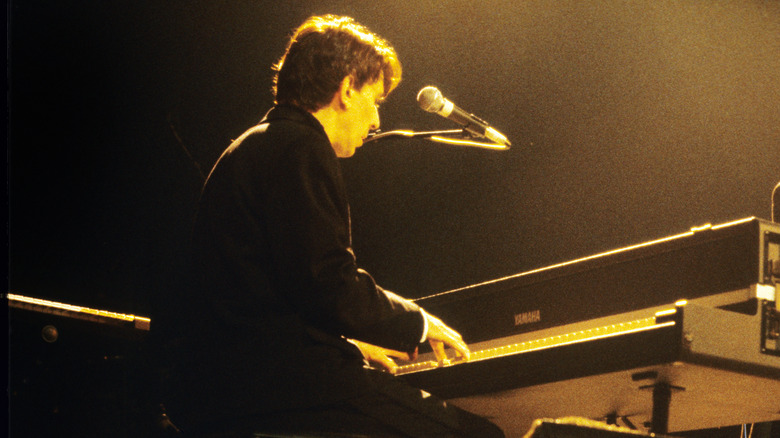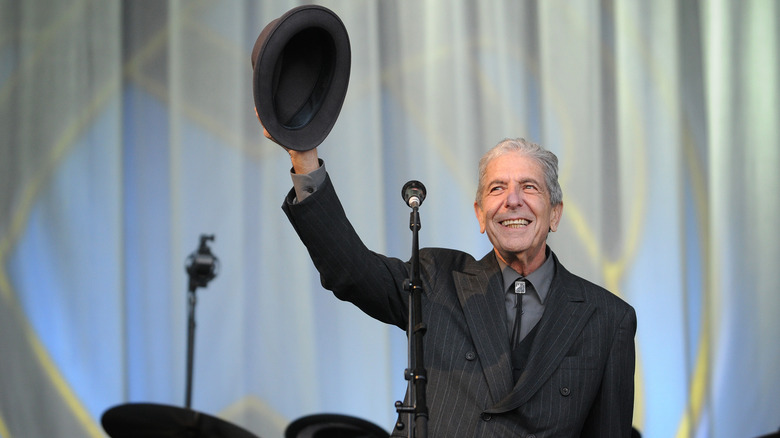The Original Version Of Leonard Cohen's Hallelujah Was Staggeringly Long
If you're not familiar with Leonard Cohen's "Hallelujah," we recommend pulling up one of the many versions he recorded over his decades-spanning career right now on your favorite music vessel while you read about it here. It's just one of those songs that always sounds timely, and will always be applicable to about any and all emotionally charged situations, from funerals to births, breakups, weddings, and even the odd Tuesday morning when you're feeling strangely reflective about the human condition and/or that last episode of "Stranger Things" you watched.
Even if you're not familiar with Cohen's O.G. version, you've probably heard any one of the many covers of it that have been around since 1991, one of the most famous of which is by Jeff Buckley, done 10 years after the original came out in 1984. It's also frequently included in singing competitions and overwrought holiday specials. In fact, there are so many covers of it that many people don't realize that Cohen was the one who wrote it and was the first to record it.
The song has a long and complex history, a ton of covers, and originally had so many different verses, it's kind of mindblowing. It even has its own book.
A Life Steeped in Poetry
Leonard Cohen was born in Montreal, Quebec in Canada on September 21, 1934 (per Britannica). He originally established himself as a poet and novelist, and didn't try songwriting until the mid-1960s; he started experimenting with setting his poems to music, inspired by the New York City Greenwich Village folk scene. He didn't start performing and recording his own songs until he was in his 30s, but was almost immediately adored by critics and regular music fans alike. As with most any long-term career, particularly in the arts, there were ups and downs, but Cohen's reputation for uncompromising craftsmanship and soul-stirring poetry delivered in that rumbling, gravelly voice remained.
After his ninth album in 1992, he retired from the music business and literally lived the life of a Buddhist monk in a monastery outside of Los Angeles until 1999. He'd go on to record two more records before discovering in 2005 that his longtime business manager had skimmed millions of dollars from his retirement account, forcing the 71-year-old to go back on tour for the first time in 15 years. His career and public adoration flourished, and he continued creating until he passed away in November 2016; his 14th and final studio album, "You Want It Darker," was released only weeks before his death.
A Disaster
There are many accounts of how "Hallelujah" came into the world, including the iconic tale of Leonard Cohen being driven mad by it; so mad, according to The New York Times, among many others, that he wound up on the floor of his hotel room in his underwear, banging his head on the floor because he just couldn't finish the song in a way that was satisfactory to him.
Thankfully for his colleagues, that angst happened out of the recording studio. The first recorded version of "Hallelujah" was in 1984, on Cohen's record, "Various Positions." Alan Light delved into the song's genesis and history in his book, "The Holy or the Broken: Leonard Cohen, Jeff Buckley, and the Unlikely Ascent of 'Hallelujah'" (per Rolling Stone). Light wrote that John Lissauer, producer and frequent collaborator of Cohen's, said that Cohen brought "Hallelujah" into the studio with a lean four verses about halfway through the recording sessions, but it took some doing to get there.
"If he wasn't up to recording, if he was still working on something, then we just wouldn't go in," Lissauer said. "But he'd never go in and act out the tormented, struggling artist."
Cohen and Lissauer's final version of "Hallelujah" would, of course, go on to enormous success. But when they proudly presented the "Various Positions" record to Walter Yetnikoff, the president of CBS Records, he called the record "a disaster," and refused to release it, according to The New York Times.
The Resurrection of a Song
"Various Positions" allegedly didn't have any appeal to the MTV generation, with their slick videos and complicated haircuts, as Leonard Cohen turned 50 that year and was, to the hits-factory mentality of the music industry, irrelevant (per Alan Light, via Rolling Stone). Thankfully, the record was released overseas, and two months later, indie record label PVC Records released it in the United States. Columbia Records would later buy back the rights when they were rereleasing Cohen's entire catalog on CD.
"['Various Positions'] had songs like 'Dance Me to the End of Love,' 'Hallelujah,' 'If It Be Your Will' –- but it wasn't considered good enough for the American market," Cohen said. "So there's a certain mild sense of revenge that arose in my heart." But just because it was out in the world, "Hallelujah" wasn't regarded as an instant classic that every aspiring vocalist wanted to cover; that would take a few more years.
In 1991, Columbia Records released "I'm Your Fan," a Leonard Cohen tribute record (per Discogs). The anthology of college radio darlings covering Cohen's work included The Pixies, Nick Cave and the Bad Seeds, R.E.M., and Ian McCulloch (of Echo and the Bunnymen relative-fame), bringing the gravel-voiced poet to a whole new generation of cynical, discontented music fans. Also on the record was the Velvet Underground's John Cale with his gorgeous, stripped-down cover of — you guessed it! — "Hallelujah."
A Long Roll of Fax Paper
At that time, Googling lyrics wasn't an option. John Cale wanted to be sure he got the lyrics correct, so he did what any rockstar would do — he called Leonard Cohen and asked if he would fax the lyrics to Cale. And, according to People, the volume of lyrics was more than he was expecting.
"Fifteen verses," Cale said. "It was a long roll of fax paper ... Some of them were religious, and coming out of my mouth would have been a little difficult to believe. I [chose] the cheeky ones." Cale's version was sparser than Cohen's initial, synthier recording, and invoked a feeling of human fragility grappling with questions of the divine, even without the verses specifically referencing religion. It would also inspire young Jeff Buckley to record one of the best-known versions of the song, which he released on 1994's "Grace," and, tragically, was his only record before drowning in the Mississippi River at age 30. Within 10 years, the number of covers of "Hallelujah" would explode to about 300, and the song would get some long-overdue love.
But the 15 verses that Cale mentioned were just the tip of the iceberg. Finishing the song reportedly took Cohen five years, yielding a whopping 80 verses in its original, completed form, according to The Telegraph. Cohen would eventually record a second, reportedly more sex-centric version in 1994, and whenever performing "Hallelujah" live, would rotate in different lyrics throughout the years.
OK, But Where Are the rest of the lyrics?
As many writers will tell you, generating an abundance of material is crucial, as it's easier to edit and sharpen a piece if there's plenty of it to be discarded. "Hallelujah" seemed to be no exception. And, per Rolling Stone, the song's focus changed over time, allowing Leonard Cohen to edit it down to the four verses he recorded in 1984. "It had references to the Bible in it, although these references became more and more remote as the song went from the beginning to the end," Cohen said. "Finally I understood that it was not necessary to refer to the Bible anymore. And I rewrote this song; this is the 'secular' 'Hallelujah.'"
Cohen fans of all ages and walks of life have gathered every verse they can find, but still, no one has been able to find all 80. Well, except maybe the University of Toronto. In a post from September 21, 2018, on the official Leonard Cohen Facebook page, Cohen had donated about 100 boxes of his written correspondence and other documents from his life to the Fisher Library at the University of Toronto. The post said, "Yes, those 80 verses to the song 'Hallelujah' have been found and so much more." So far, the rest of the verses remain a mystery to the general public.
